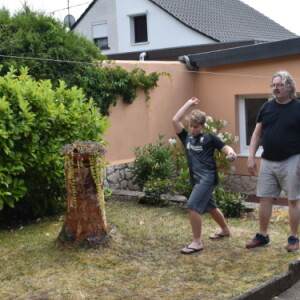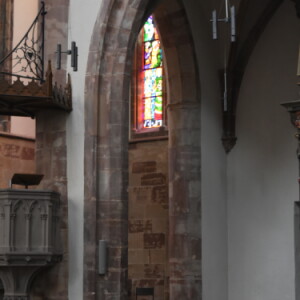Saarbrücken: frigging brilliant
There really are so many things to love about Saarbrücken. It's not one of those "in your face" types of towns that people go to on package tours, but in its own quiet and unassuming way, it is perhaps my favourite town in Germany. We spent a happy day with M, and visited Sankt-Arnual, with its 14th century church (in which I set part of a scene in one of the first chapters of The NovelTM), then went into the city centre ofr ice cream, an explore and finally dinner at Tante Maja, with quite possibly the most sullen waiter I have ever had the fortune to not tip.
In case there is interest, below is the chapter of the novel in which SB and Sankt Anual is mentioned (it's good for sleeplessness, if, I am afraid, little else).
Much, I imagine, to Mr. Hernandez’s surprise and perhaps, indeed, annoyance, when I called the following afternoon at the appointed hour, I was unable to provide him with an answer, and so, we eventually agreed that I would stay in New York for a further three days. He had booked me into a rather nice room at the Algonquin, forth from which I sallied on several long walks of reminiscence, and not just to shake off the crapulousness of evenings using the McNaughton account to sample single malts in the Algonquin lobby bar.
It was during the last of these walks that I ended up outside St. Bartholomew’s Church on Park Avenue, wondering whether I should go for a restorative Bloody Mary at the Waldorf or have what I imagined would be my final look at Meiere’s splendid stained glass windows and Art Deco domes inside the church.
After a brief period of uncertainty during which I changed my mind several times, each time decisively, my cane and I moving with attempted vigour towards the object of my decision before executing a shuffled three-point turn as the alternative became the preferable option (at one point, this manoeuvre prompting a passing nun to inquire as to whether I needed some sort of assistance), I chose the church.
While I am not in the least bit religious, one does occasionally hope, especially at my age, for the blinding flash of revelation, if not Revelations. It is perhaps, as Suzanne might say, rather arrogant to believe oneself worthy of divine intervention at the St. Paul level – and if it doesn’t come when keeling over on the veranda of the Halekulani, there is little reason to believe it should when attempting to divest oneself of a minor hangover in New York City – but one lives in hope. I decided against a tour, preferring to wander lonely, neck craned to see the stunning artwork and iconography.
What a magnificent church St. Bart’s is, I thought.
I am quite a late convert to religious structures, if you’ll excuse the obvious pun. While I still find myself quite incapable of assimilating any message from the larger ones – Westminster Abbey, Il Duomo, Saint John the Divine, they all seem to be trying too hard for my liking – some of the smaller churches and newer cathedrals sometimes leave me speechless. Some of them, indeed, have had a profound effect on my psyche.
Shortly after my retirement, I travelled to Germany. One July lunchtime, I ended up in a small square in a rather out-of-the way suburb of Saarbrücken, eating grilled bream with saffron rice and washing it down with a chilled pinot gris under the shade of a solitary linden tree. Tandaradei. Now, few are the guide books that tell you to visit Saarland, and even fewer that tell you to go to see the old village of Sankt Arnual, but as I walked around the thirteenth century collegiate church, I felt for the first time as if I understood what all of the architects and stonemasons and artists were saying. There was a realness, an authenticity about it all. In fact, there was a simplicity and a unity that one just doesn’t get from the opulence of Roman Catholicism. There, in the cool of the transept, I felt a sudden peace. Not a religious awakening, let me hasten to add, just a stillness. I sat in the small church for almost three hours, listening to the silence. The occasional visitor would clunk open the heavy side door, nod his head and mutter a terse “Tack” in my direction, yet this merely served to accentuate the calm. It was the first indication I had ever had of the power of religious architecture, and it quieted the mind. I suppose this is what those yoga types get from meditation; in any case, it was while sitting there that I decided to write my autobiography.
Now, St. Bart’s may be a far cry from a thirteenth century German collegiate church, but it is nonetheless a place that moves me. And, as I shuffled around, admiring the baptismal chamber with its relief of the Last Supper, the cool Indiana limestone began to have the anticipated calming effect. As in Sankt Arnual, my mind cleared and I was able to focus on the matter at hand, which in this case was, as you may recall, also to do with my autobiography.
I stopped some distance from the Sanctus window, admiring the blue-winged cherubim and the red-winged seraphim above, each giving way to the archangels and thence to the centre of heaven, the sun, eclipsed by the cross. How glorious it must be to be able to ascribe to this vision of existence and have it make sense to you. I had tried, when younger, to will some divine being into my heart. I couldn’t do it. Bits of it made sense, I suppose, at least as much sense as anything else I knew of in the late 1950s. But one always had the impression one was in The Wizard of Oz and that Frank Morgan would pop up from somewhere behind a curtain. For a long time, I would hesitate to walk past confessional booths.
Yet, as I stood there, in front of the marvellous Sanctus window, I tried nonetheless to look for inspiration: a sign, a message, anything. It was curious, I thought, looking up at the host of angels, that the word angelos in the Greek, originally meant a messenger. A messenger of God. Just like Mercury. My entire life seemed to revolve around the concept. And now here I was, asked to deliver my final message (let’s not be coy, I’m 83, I will most likely be pushing up the daisies by the time my book is published) and I was incapable of so doing. A reputable publishing house was offering me an advance – money I needed, to boot – and I was unable to think of anything to write. It was rather inconvenient.
A young couple had moved close to where I was standing and were discussing the window. He, a rather earnest young man in a green sweatshirt emblazoned with a yellow cross, was explaining in a rather raspy, whiny voice, the meaning of the window to what I assumed was his wife or girlfriend.
“Sang twos means ‘holy’, Beth,” he said. “All of those angels are praising God, just like it says in Isaiah 6, when he has his vision. They are saying ‘Holy, Holy, Holy, is the Lord of hosts / The whole earth is full of His glory.’”
“But what’s the point of it all nowadays, Jeff?” asked the woman. “I mean, I get it that people used to like these windows when they couldn’t read, like you said, in olden times, in Europe. But we can all read now, can’t we? This whole place just creeps me out. All this money spent on stuff that has no meaning. I mean, what is the point of it all?”
I took an instant liking to her. How refreshing to hear the young questioning something.
“It’s all symbolic, Beth,” he answered. “You’ve seen The Da Vinci Code haven’t you? Great movie, all about the hidden symbols of the church.”
“I hated it. I hate Tom Hanks,” she said. “I hate all that Catholic symbol shit. I mean, fine, if you want to worship God, worship God. But this isn’t worship, Jeff. It’s bigging yourself up. ‘Look at my church – look how rich it is,’ all that kind of shit. I hate it.”
“Well, if you remember from college, Looter didn’t like it much either,” said Jeff. “The decorations and the candles and all that stuff. He went and told the Pope to stop it. Nailed some demands to a church door. Militant agitate or something like that.”
“Poenitentia agite,” I said, suddenly, out loud.
The young couple turned towards me abruptly, clearly uncertain as to the provenance of the information but suspecting it, I imagine, to not be divine.
“I’m sorry, sir, did you say something,” said the man. They both stared, smiling, yet strangely not with their eyes. I smiled back, then shook my head as if in acknowledgement of my own eccentricity.
“The phrase was Poenitentia agite,” I said, somewhat sheepishly. “Luther was against the selling of indulgences by priests. He felt that a person’s whole life should be an act of repentance. The way to Heaven was through faith, not just by having the money to buy forgiveness.”
“Right,” said Jeff, still smiling, but now putting his arm round Beth and attempting to move off. “Thank you.”
“I’m sorry,” I said. “I didn’t mean to eavesdrop. I couldn’t help but hear what you were discussing. I don’t like Tom Hanks, either,” I said, smiling at Beth. “Insufferably smug.”
Beth turned her head and smiled back at me as they were walking off, arm in arm, in the direction of the bookstore. Poor girl, I thought.
Was that a message? Repent? God, I hoped not. Not from an over-earnest New Jersey bible basher. Repent what, for a start? My arrogance? My pride? Like everyone else, I have been guilty of that, I suppose. I’ve lied, on occasion. But I’ve tried my hardest to avoid it. Truth is, after all, one of the tenets of reliable journalism. I suppose it might be theft: I was, after all, caught stealing a cake from my local grocery store when I was seven. (The man, who was in reality very kindly, nonetheless dragged me home, squealing, by the ear. My father was livid, and whipped me soundly; my mother refused to look at me for a week: this, of course, put an end to my life of crime.) I’ve never killed, borne false witness, raped, used or profited from whores (other than, I can hear you say, the obvious politicians about whom I wrote). In fact, my life has not been marked by any special sin or wrongdoing. Sometimes I wish it had been.
I was married faithfully for 27 years until my wife suddenly, unexpectedly died. I am a loving father and, whenever I get the chance, a giving and doting grandfather. (My daughter lives in Spain, my son in New Zealand; we are close, but not in each other’s pockets. They were both at university when Sofie passed on.) When she went, I renewed my devotion to The Mercury until my retirement. I have led what most might term a good life. I’ve paid my taxes, fought for inclusion and tolerance and understanding. I’ve given people the benefit of the doubt, donated to charity, taken in stray dogs and looked after them. As Sofie was keen on saying while she was alive, I’ve “got bugger all to apologize for”.
I moved slowly away towards the south end of the church, intending to slip into the chapel and sit down for a while, rest my weary bones as it were. As I shuffled, my mind went over the short conversation with the young couple. In a novel, I would have taken that as a sign that my book should be an act of repentance or atonement. But the fact was, it was a random conversation caused by my inability to not listen in on what other people were saying. A terrible habit. A journalist’s habit. Two words of liturgical Latin popping into my head was more an indication of my own senescence than of a non-existent deity sharing His vision. No matter how divine Beth might have been.
And why must divine messages always be so bloody allegorical? Surely, it would not be much more complicated for God to say “Write a book condemning iconography, it really upsets me,” than having me overhear a dysphonic imbecile pronounce Luther as if he were about to carry off a television from Walmart in the middle of a blackout and misquote the opening gambit of his 95 theses. And in the wrong bloody language. No, that wasn’t a message, it was an irritation.
I passed through the carved oak doors and found, to my surprise and delight, the space to be empty. My mood lifted and the weight seemed to fall from my shoulders. The high vaulted ceilings seemed to draw the eye to a mural at the altar end of the chapel. I sat on the first bench, next to the aisle, grateful for the softness of the green cushion against the hard wood. I stared down the line of benches, chevronning away from me towards the altar, and looked more carefully at the mural behind it.
Surrounded by a series of thirteen painted medallions of the boyhood and infancy of Christ, was the Adoration of the Magi, which was, I recall, created by the Paullins around the turn of the previous century. At least, I think it was the Paullins. All this information and so little time to fact check. I sat there for almost an hour, looking at the stained glass windows and standing up occasionally to pat the granite columns, revelling in their solidity. They would be here, this would all be here, for many centuries after my departure.
Finally, relaxed and calmed, but no clearer as to what I should write about, I rose and headed out into the chill autumn air, the sun rapidly disappearing behind wispy but thickening cloud. I walked along to East 49th Street, took my life in my own hands as I crossed Madison Avenue, and continued on for another block until I got to 5th. It was shortly after 3 p.m. I stood there for a minute, looking up at the ivy-strewn doors of Saks & Company on the other side of the street, and wondered whether I should go back to the hotel or go and walk around St. Pat’s Cathedral for an hour. Then, suddenly, I became aware of a pain in my stomach and realized I hadn’t eaten all day. The hotel it was. So, I turned left onto 5th, and hobbled painfully along until I came to West 44th and saw the welcoming green awnings. I entered the spacious lobby, walked over a field of tulips to collect my key, and took the cramped elevator back to my room.
As I took off my overcoat and prepared to call room service, there was a knock at the door. I opened to find the man from the concierge desk standing there, obviously quite anxious, slightly out of breath and hopping, metaphorically at least, from one foot to the other.
“I’m so sorry sir,” he said. “I forgot to tell you there was a message for you. A Mr. Hernandez stopped by to see you earlier this afternoon. He asked if you could call him as soon as you get in.”
“Thank you,” I said, and reached to my jacket pocket to give him a tip.
“No need, sir,” he said. “I apologize again for not telling you as soon as I saw you.”
Well, now I’ve seen everything, I thought, closing the door. An American concierge refusing a tip. How extraordinary. And I wonder what Mr. Hernandez wants that can’t wait till tomorrow morning?
I sat down on the edge of the hotel bed and kicked off my shoes, lying back across the middle of the mattress so my feet still touched the floor. I was tired. My stamina was not what it had been before the heart operation. It would get there, they said, provided I didn’t overdo it and was patient. Walk, they said. Take the stairs. Have a ‘heart healthy diet’, they said. Drink alcohol only in moderation, they said. Groaning, I pushed myself upright and reached for the phone. I called Mr. Hernandez and he arranged to come to the hotel for an aperitif at 5.30. We agreed to meet in the Blue Bar. It was now 3.45.
Anxious, as I have been all my life, to avoid the shame of lateness, I put on my shoes and decided to go and wait for him in the bar. I might conceivably have a Bloody Mary to while away the time and line my stomach in preparation for an early dinner.




Comments
Sign in or get an account to comment.


